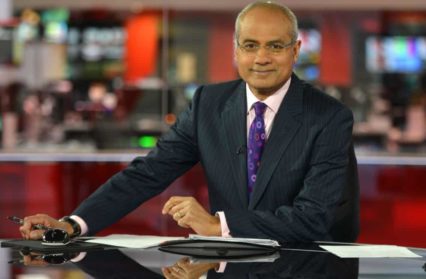Dylan Moore is at the 2012 Hay Festival to hear a discussion between George Alagiah and Sarfraz Manzoor based on Alagiah’s BBC documentary Mixed Britannia.
There are many things you could say about the diversity of a Hay audience, but it is predominantly white. Even at this session, fronted by a Briton of Pakistani birth and an Englishman of Sri Lankan birth, a quick scan of the Llwyfan Cymru suggests this is the case. During the extended Q and A session at the end, Sarfraz Manzoor practices positive discrimination to elicit responses from the small number of non-white people in the giant marquee. After an interesting and thoroughly engaging debate, based on George Alagiah’s BBC documentary Mixed Britannia, Manzoor jokes that ‘I’m interested in what the audience has to say… for once.’
And audience participation is key to the debate. Although at one point Alagiah protests BBC impartiality, his commentary on how Britain has become a world leader in mixed race relationships is infused with a core belief that families and communities, rather than the state, hold the answers to the problems and complexities thrown up by the fact that – if you count it as an ethnic group – ‘mixed race’ is the fastest growing ethnic group in Britain.
The session begins with a clip from the series, a beautifully shot clip of a union between a white man and his Indian bride. Alagiah admits that his documentary emphasised the positives, arguing that ‘we know the other story, about racism.’ Instead, he offers a glimpse of how we reached the – certainly relatively to comparable countries in North America and Europe – tolerant state of affairs that exists today.
Alagiah’s ‘modern social history’ is particularly keen to celebrate the courage of the first white British women to fall in love with sailors in the docks areas of Cardiff and Liverpool and South Shields. Britain’s proto-multiculturalism goes back way beyond post-war Commonwealth immigration and Alagiah’s starting point is the 1890s, when Yemeni seamen started settling in Tiger Bay.
In Wales, the story is much documented, and it is heartening that a UK audience is subjected to tales of how ‘a genuinely communal end of Ramadan procession’ made its way through Cardiff’s streets in the early years of the twentieth century. For George Alagiah, political attempts to define and promote multiculturalism via the acceptance of difference flew in the face of its original, organic, inclusive incarnation.
‘These women were truly heroic,’ says the popular newsreader, ‘they had everything to lose; they were feminists before the term was even coined. When there were problems – there was violence – these women were out there defending their menfolk and their communities.’ Later, when black American GIs were stationed in Britain during the Second World War, British women challenged the segregation policy of the US army, simply by accompanying their boyfriends to the cinema.
Alagiah’s experience of making the programmes was a rewarding one in many ways – not least because he is in a mixed-race relationship himself – and he professes to enjoying longform programme-making. For news, ‘you have to work with a team of editors and researchers to essentially reduce the world to 26 minutes’; by contrast, Mixed Britannia often relied on ‘sitting for three or four hours drinking tea with Jean or Norman’, building the relationships required to elicit real insights on the topic.
Manzoor is keen to challenge some of his interviewee’s cosier assumptions – his own brother and sister have stopped communicating with him following his marriage to a white woman – and Alagiah’s critics have accused him of turning the story of race relations in Britain into a ‘romance’. But Alagiah defends his corner consistently by drawing our attention away from race. By the end of the debate, we see race as only one aspect of identity, and one which should never overrule those more important aspects like character.
But this being Britain, Sarfraz Manzoor and George Alagiah are agreed on the fact that ‘class trumps race’ here. Alagiah’s BBC accent is much more important than his passport, he reports. ‘Just one word can convey a wagonload of information,’ he says. And in response to a question from the audience: ‘Race is a tick-box thing; culture is much more interesting.’
At Hay – a world away from Bradford and Tower Hamlets, or forced marriages and honour killings – there is an acceptance of this as fact. The Wales Stage is a haven of common sense. Where the debate has moved on from what George Alagiah calls ‘fake multiculturalism’ is in that it is no longer about tolerance. Intolerance should no longer be tolerated, seems to be the message. We owe it to those women in Tiger Bay, and – if we happen to fall in love with someone with a different coloured skin or a different cultural heritage – we owe it to ourselves.
Dylan Moore has contributed regularly to Wales Arts Review.












